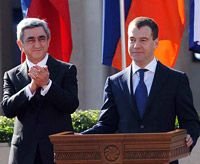Finally the Russian President Dmitry Medvedev will visit Armenia today, whose visit to our country caused long-lasting and intensive discussions.
Currently the visit of Medvedev and the signing of several documents in that context have turned into the top debate issue of Armenia. That visit has even pushed backward the priority of the NKR conflict resolution and the rapprochement of the Armenian-Turkish relations. Perhaps the reason is that the resolution of those two big issues mainly depend on Russia and the documents that may be signed as a result of Medvedev’s visit. The signing of the protocol is high on the agenda of Medvedev’s two-day state visit to Armenia, which also overlaps with an unofficial summit of the Collective Security Treaty Organization, a Russia-led military alliance of seven former soviet states, to be hosted by Yerevan. Corresponding amendments to a 1995 treaty regulating the presence of a Russian military base in Armenia will extend Russia’s basing rights by 24 years, to 2044, and upgrade the mission of its troops headquartered in Armenia’s second largest city of Gyumri close to the border with Turkey. According to a relevant “protocol” submitted to Medvedev by the Russian government, besides “performing functions on defending the interests of the Russian Federation,” the Russian military base also “jointly with the Armed Forces of the Republic of Armenia ensures the security of the Republic of Armenia.” The document also commits Russia to supplying its regional ally with “modern and compatible weaponry and special military hardware.” The move is likely to cause concern in neighboring Azerbaijan, which has an unresolved conflict with Armenia over the disputed Nagorno-Karabakh region. During the past 15 years this base was deployed along the Armenian-Turkish and Armenian-Iranian borders. But besides Turkey and Iran Armenia is also neighboring Azerbaijan and Georgia. Especially to the last country Russia has open hostile relations. It means that the two presidents will also discuss the possibility of the move of the Russian troops to the above-mentioned bordered in case of necessity. According to our information, this change is basically directed against Georgia. Let us recall that the changes to be signed tomorrow will enable Russia “provide security for Armenia.” It means that at any moment Russia can provide security along the Georgian-Armenian border. And it is not hard to assume what this fact will do. It is enough to only remember the short Russian-Georgian war in August of 2008. Russia introduced Ossetia with the purpose of protecting the Russian citizens living there. They destroyed the place and almost approached Tbilisi. And if wish it is no difficulty to attempt to intimidate Georgia. This becomes more evident on the background of the opinion of certain pundits that during the Russian-Georgian conflict Mikhail Sahakashvili simply got cheated by Russia’s provocation. And tomorrow’s document has such a formulation, “the application of the formulation of the Russian base is realized with the mutual consent of the parties.” What does this expression mean? This can be done orally and in a written form. The state officials responded to us that they can provide information about the contents of the document once they are signed. We also tried to receive the comment of the foreign affairs ministry. The spokesman of the ministry mentioned the following. “The mutual agreement of the parties means that the sides jointly consent to the provisions of the agreement. In this case we are speaking about the Republic of Armenia and the Russian Federation. The two subjects should come to an agreement.” A range of officials, who didn’t wish to introduce themselves, ensure that the phrase “the mutual agreement of the parties” didn’t appear in the document by accident. This indefinite definition can imply anything, including the move of the Russian troops to the Armenian-Georgian border. Let us remember that in parallel with the prolongation of the terms of number 102 military base the Russian side informed that it intends to restore its south Caucasian military division. It intends to rename it to “Yug” and jointly with Gyumri military base include it with the military bases of Abkhazia and South Ossetia. This intention implies evident anti-Georgian elements. And in general Russia acquires the chance of bargaining its geopolitical interests in this region under pretense of the security of Armenia as an occasion. Russia acquires great opportunities with the phrase “mutual agreement of the parties.” For this empire it is no problem to get the consent of Armenia. There is even no need to ask. Let us mention that according to certain opinions by this visit of Medvedev the issues to be solved are only a part of Russia’s intentions in this region. The next step to be undertaken by Russia, according to experts, relates to the removal of the Armenian troops from the neighboring territories of the NKR and deployment of the Russian troops there. By “random coincidence” Medvedev will visit Baku in September. It is hard to say whether Baku will agree with the deployment of the Russian troops in this region. It will be really difficult for Medvedev to persuade and make Aliyev understand that it’s necessary to have Russian troops in the 5 territories.

